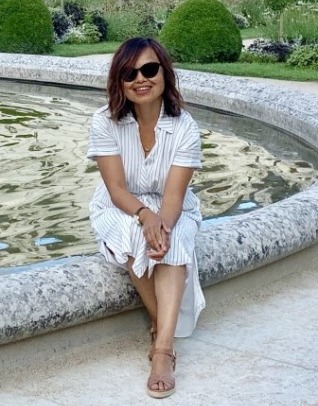
French Language and Culture
The French Language and Culture Program prepares you to study abroad in France or Senegal by building necessary skills such as reading and writing, understanding basic to advanced grammar and vocabulary, and exploring social customs and traditions in French-speaking countries.
Inspiring Long-Term Learning
The language classroom is an inspiring locus where I share the elegance and the relevance of French studies with my students.
On and Off Campus Culture
On Campus
Pi Delta Phi (French National Honor Society for undergraduate and graduate students at accredited public and private colleges and universities in the United States).
Off Campus
Students go on field trips to restaurants, bakeries, farmer’s markets, and the Alliance français of Los Angeles or San Diego.
Thinking about your next step after graduation?
Course Offerings
The courses are taught in French.
Introduction to the basic structure and function of the modern French language, covering the basic sound system, grammatical constructions, writing system, and basic vocabulary and expressions. Important cultural aspects of the language are discussed as well.
Prerequisite: FRN 101 or instructor consent.
Continuing development of the fundamental aspects of the modern French language as in FRN 101, with additional vocabulary/expressions and analysis of grammatical constructions.
Prerequisite: FRN 102 or instructor consent.
Aims at further developing students’ French language proficiency in the six aspects of listening, speaking, reading, writing, grammar, and cultural understanding.
Prerequisite: FRN 201 or instructor Consent.
Continuation of FRN 201, while further enhancing students’ proficiency in listening, speaking, reading, writing, grammar, and cultural understanding. Relevant linguistic, sociolinguistic, and cultural information to prepare students for Study Abroad programs is included.
To Speak, Listen and Understand
Prerequisite: French 202, or instructor consent.
This course is an advanced language course primarily designed to further develop listening and speaking skills and to increase writing ability, with particular attention to advanced syntax and to vocabulary expansion.
To Write, Describe and Demonstrate
Prerequisite: FRN 202, or instructor consent.
Designed to bring students to an advanced level of proficiency in grammar and composition, the course emphasizes experiencing and producing the language in context through a multi-media approach. An intensive review of grammar is integrated into the writing practice. A good knowledge of basic French grammar is a prerequisite. The course will study selected grammatical difficulties of the French verbal and nominal systems including colloquial usage. It will also guide the students through the different rhetorical modes of writing in French.
Prerequisite: Completion of a study abroad program in French, or instructor consent.
Designed to examine the historical and cultural development of post-colonial francophone regions, the course surveys major historical events from the beginning of French colonization to the present day.
Prerequisite: Completion of study abroad program in French, or instructor consent.
This is an advanced writing course designed to teach students how to write creatively in French. They will explore different kinds of narrative genres, styles, and rhetoric figures by reading excerpts of famous French authors. They will develop an array of essential tools: critical reading and literary analysis; writing, revising and editing original material; greater appreciation of the interconnectedness between literary thematic content and aesthetics; and a practical understanding of the creative process. Using the tools acquired, students practice various forms of writing, culminating in their final project: writing a short story through collaborative or individual writing.
After participating in this course, students can expect to improve their grammatical and syntactic correctness in French through reading and writing, their analytical, synthetic, and critical skills in French through the study of style, and idiomatic writing.
Prerequisite: Completion of a study abroad program in French, or instructor consent.
This course is intended for students interested in the translation process, how that process can both alter and preserve literary works, and how to most effectively and accurately transfer meaning and tone from one language to another. It is designed to introduce students to the basic principles and techniques of translation from English into French and French into English. Presentations and discussions on the theoretical and technical aspects of translation will be complemented by the systematic practice of translation of selected texts in both languages. Weekly translations will be accompanied by a 300/500-word report on the student’s progress, including a reflection on the theoretical texts studied and elaboration on how those texts have been concretely applied to the translations. This course helps students develop and refine mastery of the French language through a detailed study of its specific grammatical, lexical and stylistic aspects.
Prerequisite: Completion of a study abroad program in French, or instructor consent.
This course examines the representation of the feminine body in colonial and postcolonial francophone contexts, with a particular focus on Africa and the Maghreb. Students will work with literary texts, films, paintings, photographs, and secondary readings drawn from the humanities and social sciences. We will explore orientalist representation, the role of women in nationalist movements for independence from colonial rule, and how gender has figured into debates on national identity in the postcolonial period. A final set of readings will consider how women’s bodies figure as key indices in debates on integrating Muslim majority immigrant communities into the European body politic.
Prerequisite: Completion of a study abroad program in French, or instructor consent.
Cinema is a privileged source of information and an expressive perspective on a nation’s history and culture. This course investigates key moments of the 20th and 21st centuries as they are visually and thematically represented in film. The aim of Culture History of French Cinema is to foster a greater appreciation for French cinema and a better understanding of the socio-intellectual context within which they developed. Though film analysis includes an examination of critical and theoretical approaches, prior film knowledge is not required. This is a course for students who are interested in French history and culture, film, and furthering their study of the French language.
Prerequisite: Completion of a study abroad program in French, or instructor consent.
This course examines the interactions between written texts and their theatrical and/or filmic adaptations. Students will reinforce their rhetorical skills while learning specific vocabularies pertaining to the literary, theatrical and filmic domains while expanding their experience of literature and cinema. They will critically and creatively reflect on the respective aesthetic qualities of these media. “Adaptation: Page, Stage and Screen” fulfills an essential interdisciplinary goal. Students will: learn fundamental concepts of the written and filmic texts; understand how one discipline can supplement, impact, and support another to create new meaning; and recognize the complexities and ambiguities occurring when several academic disciplines encounter what changes in the process of adapting a written play into its scenic version and then into a fiction film. This course also supports student learning in oral and written skills. Students will: further their rhetorical skills to develop an informed message supported by evidence; employ an organized structure to effectively convey that message with appropriate presentation methods; critically select and integrate sources and develop organizational strategies in writing a final paper.
French Language and Culture Faculty








